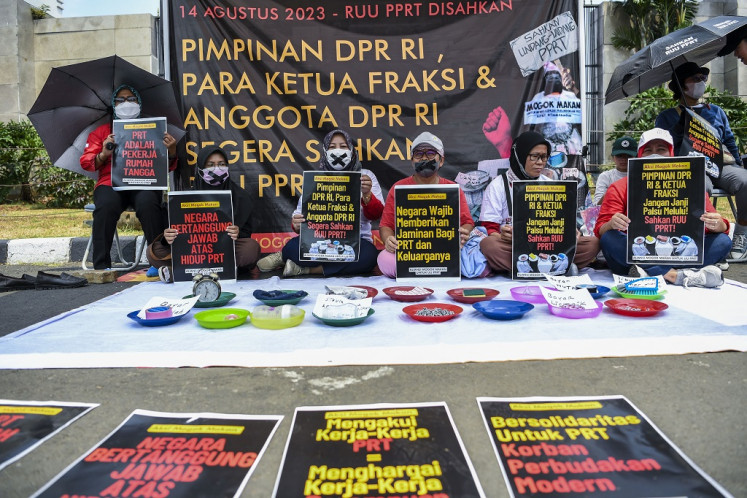Popular Reads
Top Results
Can't find what you're looking for?
View all search resultsPopular Reads
Top Results
Can't find what you're looking for?
View all search resultsLove our expats
Our bureaucrats should learn to be less xenophobic in dealing with expatriates.
Change text size
Gift Premium Articles
to Anyone
 Haze resulting from air pollution blankets the Jakarta skyline on Aug. 23. (AFP/Yasuyoshi Chiba)
Haze resulting from air pollution blankets the Jakarta skyline on Aug. 23. (AFP/Yasuyoshi Chiba)
T
he government has many reasons to make it difficult, but not impossible, for foreigners to work in the country. One of these is to protect employment and limit foreign workers to jobs that Indonesians cannot fill. It is what most other countries do too. But this is no reason for the government to extort expatriates intending to work in Indonesia.
The revelation that a unit of the Manpower Ministry dealing with work permits for expatriates has been charging illegal fees shows that this practice has been going on for years. The investigation by the Corruption Eradication Commission (KPK), which was initially limited to the 2019-2024 period, was quickly extended to 2012. That is three different administrations under three different ministers.
The KPK has confiscated billions of rupiah in cash and several cars from the houses of some of the top officials of the Directorate for the Control of Foreign Workers Utilization believed to have come from money they allegedly extorted from foreign workers or their employers. Eight officials, including a former director general for the placement of foreign workers, have been named suspects in the corruption investigation. With the extension of the investigation period, expect more people to be charged.
The KPK investigation found the unit collected some Rp 53.7 billion ($3.3 million) in illegal fees from expatriates applying for permits from 2019 to 2024. Most of the money was divided between the eight, but some was also given to lower officials, including office boys, and used to pay for lunch, presumably lavish ones, in the office.
The number of expatriates in Indonesia is not that large, thanks in large part to strict laws. In 2024, some 184,000 foreign workers were registered with the Manpower Ministry, up from 168,000 the previous year. Chinese workers account for the largest number at 54 percent, followed by Japanese, South Koreans, Indians, Malaysians and Filipinos.
Many of these workers, particularly the Chinese, come as part of foreign investment companies. Others bring specific skills and some are in the country because of their love of Indonesia, including those who have Indonesian spouses.
While the law on foreigners working in Indonesia is clear enough, the procedures can be complex and lengthy. Many workers and employers hire professional agents to help them navigate the procedures.
These middlemen charge a fee that includes the unofficial charges, including bribes, they have to pay bureaucrats to smoothen and speed up the process. The hiring company or the expatriate probably never knew that they were paying bribes, or if they did, just dismissed it as a normal part of doing business in Indonesia.
We will never know how much potential foreign investment has been lost thanks to the behavior of these bureaucrats. We know companies from the United States are deterred because of the Foreign Corrupt Practices Act, which bans companies from paying bribes to foreign officials. We suspect that the losses are considerable, not just in terms of the investment, but also in terms of their impact on the economy.
Our bureaucrats should learn to be less xenophobic in dealing with expatriates. The fact that they have agreed to follow the procedures, as complex and lengthy as they are, is already a good indication of their intention to abide by the law. Show them some respect.
Relocating to another country, for a short or long period of time, is a huge challenge for anyone. You must have a good reason to leave everything else behind, including loved ones. One or two may have bad intentions, but we must assume most come with the best intention and want to contribute to their adopted country.
The least we can do is to love them back.










